University Finance Report: Analysis of the APES 110 Code of Ethics
VerifiedAdded on 2019/10/31
|7
|1863
|217
Report
AI Summary
This report provides an in-depth analysis of the APES 110 Code of Ethics for Professional Accountants, issued by the APESB. The report examines the code's purpose, which is to establish ethical standards for the accounting profession, ensuring public benefit and professional conduct. It dissects the three main parts of the code, including fundamental principles like integrity, objectivity, professional competence, confidentiality, and professional behavior. The analysis highlights the importance of these principles for maintaining public trust, ensuring unbiased financial reporting, and preventing fraudulent practices. The report also discusses the application of the code, the safeguards required, and the consequences of non-compliance, emphasizing the need for continuous updates and strict enforcement to enhance ethical awareness and promote better professional behavior within the finance industry. The report concludes by suggesting that the authorities should consider the feedback from professionals and other stakeholders to incorporate the necessary changes and improvements.
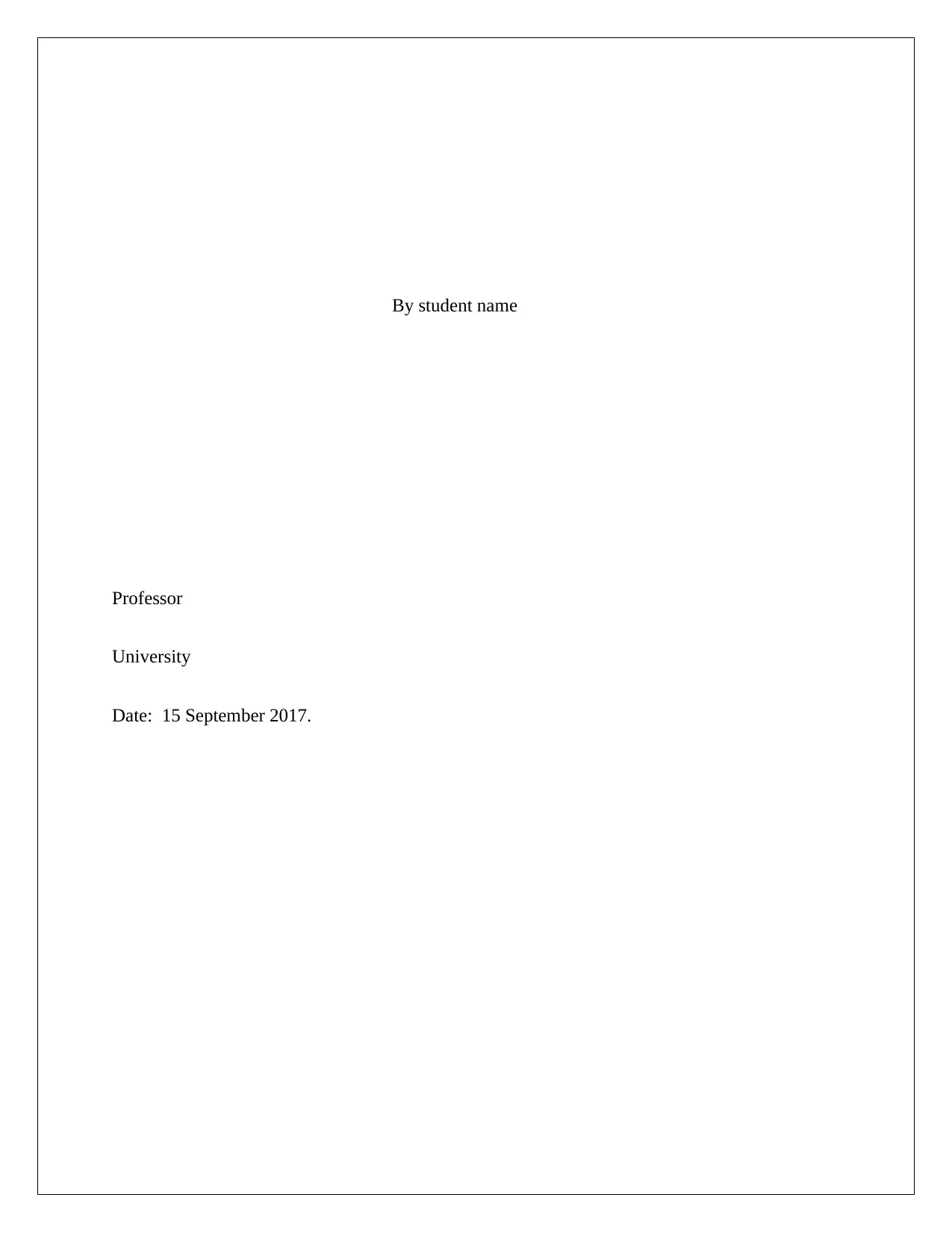
By student name
Professor
University
Date: 15 September 2017.
Professor
University
Date: 15 September 2017.
Paraphrase This Document
Need a fresh take? Get an instant paraphrase of this document with our AI Paraphraser
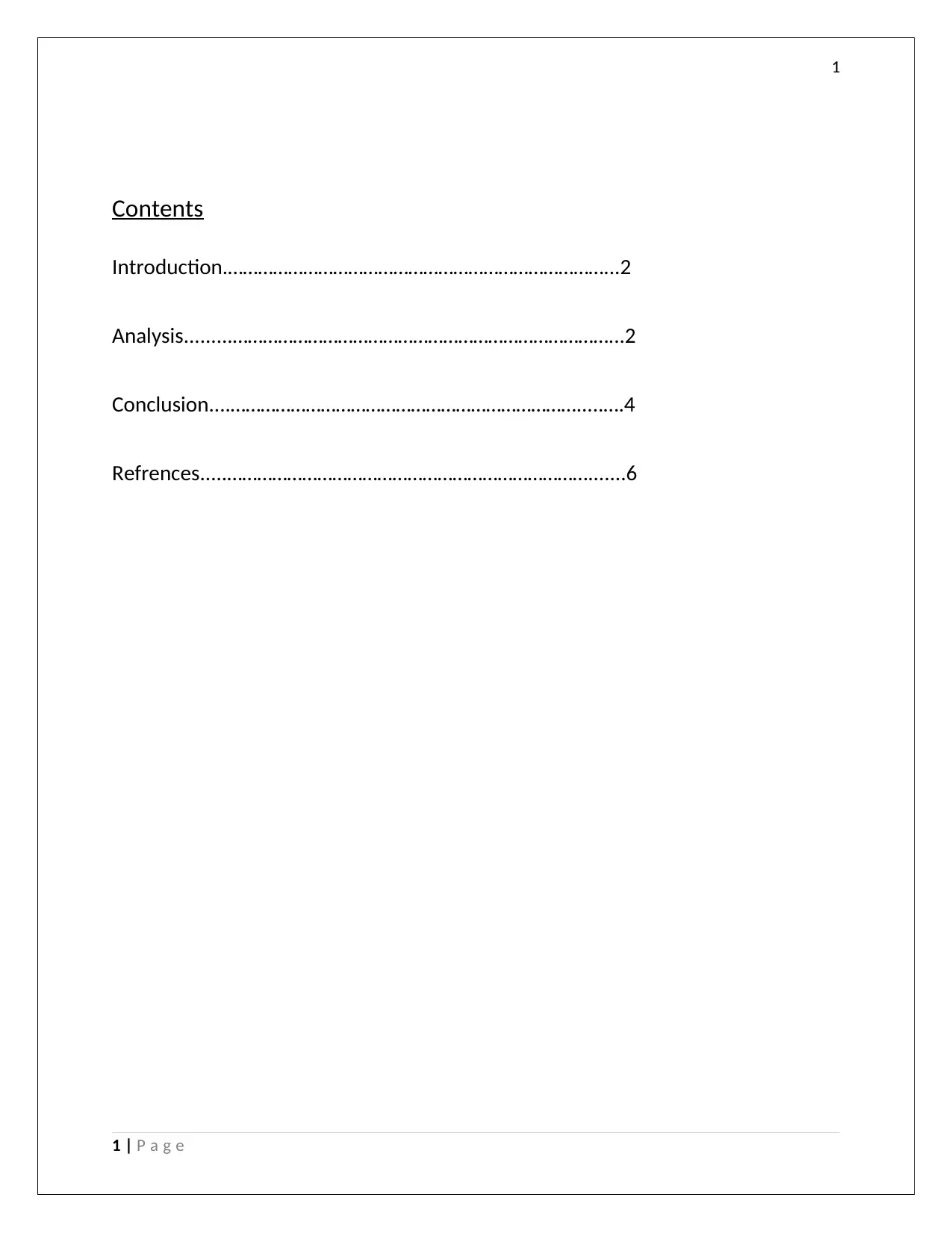
1
Contents
Introduction.…………………………………………………………………...2
Analysis.........…………………………………………………………………...2
Conclusion....…………………………………………………………….....….4
Refrences.....……………………………………………………………….......6
1 | P a g e
Contents
Introduction.…………………………………………………………………...2
Analysis.........…………………………………………………………………...2
Conclusion....…………………………………………………………….....….4
Refrences.....……………………………………………………………….......6
1 | P a g e
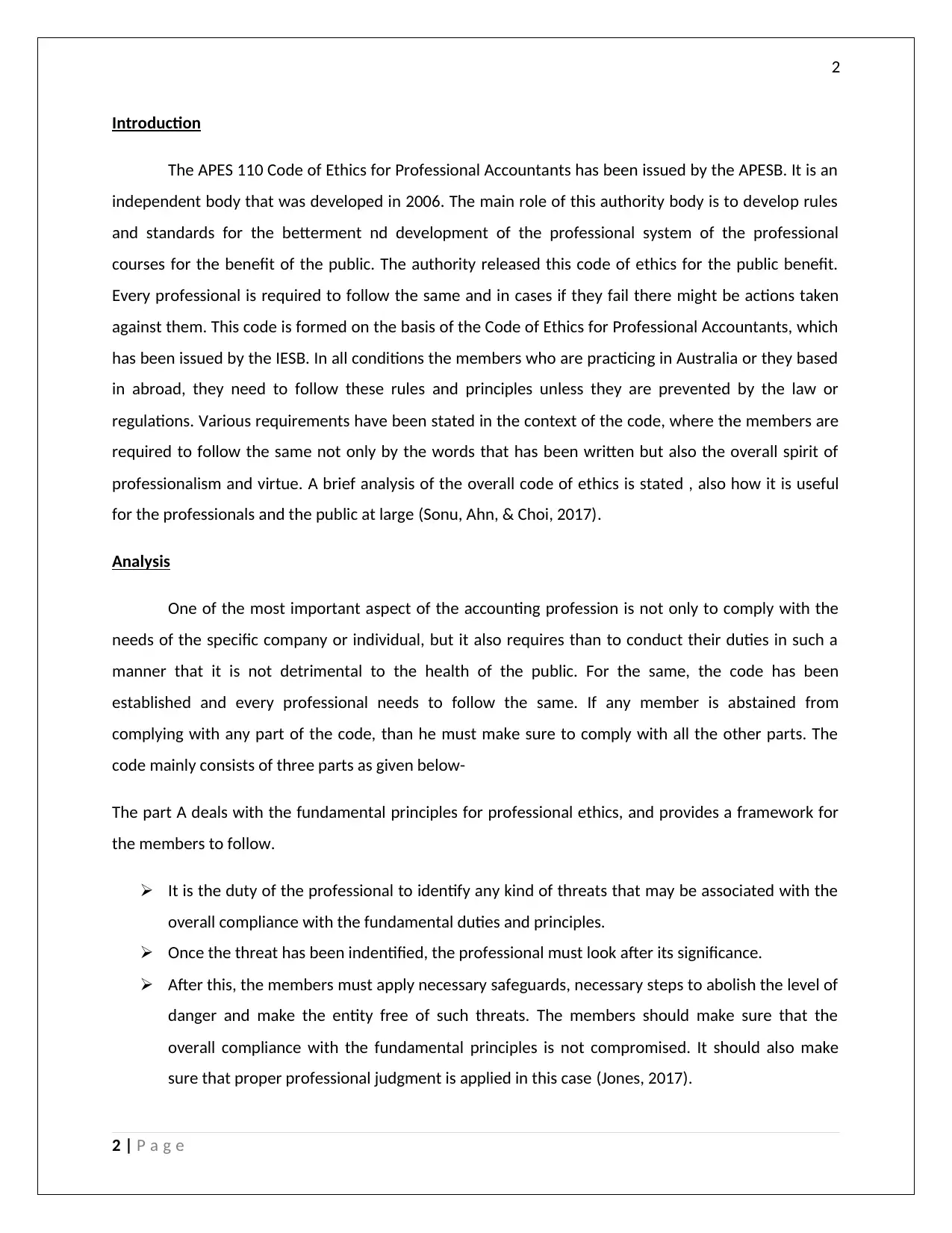
2
Introduction
The APES 110 Code of Ethics for Professional Accountants has been issued by the APESB. It is an
independent body that was developed in 2006. The main role of this authority body is to develop rules
and standards for the betterment nd development of the professional system of the professional
courses for the benefit of the public. The authority released this code of ethics for the public benefit.
Every professional is required to follow the same and in cases if they fail there might be actions taken
against them. This code is formed on the basis of the Code of Ethics for Professional Accountants, which
has been issued by the IESB. In all conditions the members who are practicing in Australia or they based
in abroad, they need to follow these rules and principles unless they are prevented by the law or
regulations. Various requirements have been stated in the context of the code, where the members are
required to follow the same not only by the words that has been written but also the overall spirit of
professionalism and virtue. A brief analysis of the overall code of ethics is stated , also how it is useful
for the professionals and the public at large (Sonu, Ahn, & Choi, 2017).
Analysis
One of the most important aspect of the accounting profession is not only to comply with the
needs of the specific company or individual, but it also requires than to conduct their duties in such a
manner that it is not detrimental to the health of the public. For the same, the code has been
established and every professional needs to follow the same. If any member is abstained from
complying with any part of the code, than he must make sure to comply with all the other parts. The
code mainly consists of three parts as given below-
The part A deals with the fundamental principles for professional ethics, and provides a framework for
the members to follow.
It is the duty of the professional to identify any kind of threats that may be associated with the
overall compliance with the fundamental duties and principles.
Once the threat has been indentified, the professional must look after its significance.
After this, the members must apply necessary safeguards, necessary steps to abolish the level of
danger and make the entity free of such threats. The members should make sure that the
overall compliance with the fundamental principles is not compromised. It should also make
sure that proper professional judgment is applied in this case (Jones, 2017).
2 | P a g e
Introduction
The APES 110 Code of Ethics for Professional Accountants has been issued by the APESB. It is an
independent body that was developed in 2006. The main role of this authority body is to develop rules
and standards for the betterment nd development of the professional system of the professional
courses for the benefit of the public. The authority released this code of ethics for the public benefit.
Every professional is required to follow the same and in cases if they fail there might be actions taken
against them. This code is formed on the basis of the Code of Ethics for Professional Accountants, which
has been issued by the IESB. In all conditions the members who are practicing in Australia or they based
in abroad, they need to follow these rules and principles unless they are prevented by the law or
regulations. Various requirements have been stated in the context of the code, where the members are
required to follow the same not only by the words that has been written but also the overall spirit of
professionalism and virtue. A brief analysis of the overall code of ethics is stated , also how it is useful
for the professionals and the public at large (Sonu, Ahn, & Choi, 2017).
Analysis
One of the most important aspect of the accounting profession is not only to comply with the
needs of the specific company or individual, but it also requires than to conduct their duties in such a
manner that it is not detrimental to the health of the public. For the same, the code has been
established and every professional needs to follow the same. If any member is abstained from
complying with any part of the code, than he must make sure to comply with all the other parts. The
code mainly consists of three parts as given below-
The part A deals with the fundamental principles for professional ethics, and provides a framework for
the members to follow.
It is the duty of the professional to identify any kind of threats that may be associated with the
overall compliance with the fundamental duties and principles.
Once the threat has been indentified, the professional must look after its significance.
After this, the members must apply necessary safeguards, necessary steps to abolish the level of
danger and make the entity free of such threats. The members should make sure that the
overall compliance with the fundamental principles is not compromised. It should also make
sure that proper professional judgment is applied in this case (Jones, 2017).
2 | P a g e
⊘ This is a preview!⊘
Do you want full access?
Subscribe today to unlock all pages.

Trusted by 1+ million students worldwide
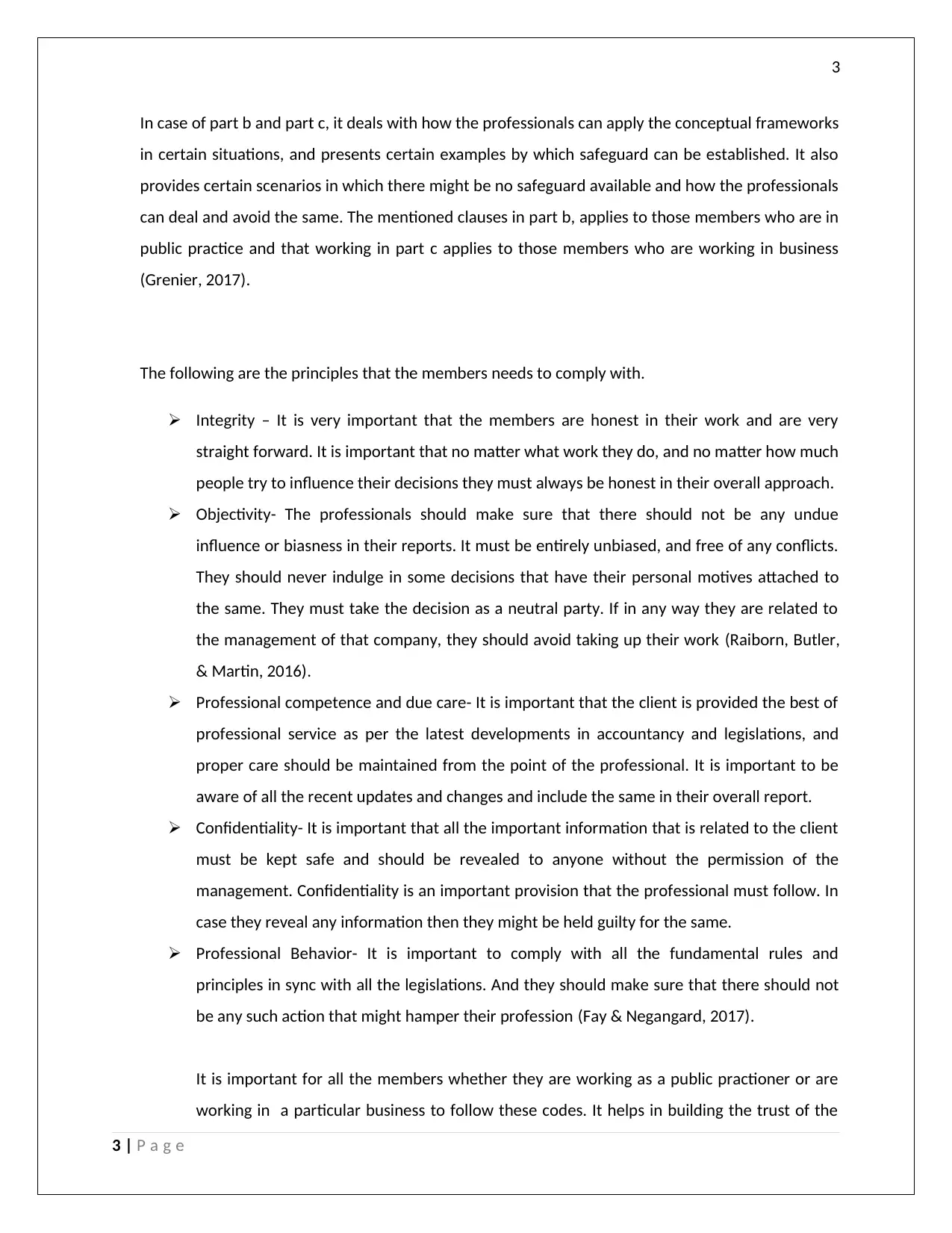
3
In case of part b and part c, it deals with how the professionals can apply the conceptual frameworks
in certain situations, and presents certain examples by which safeguard can be established. It also
provides certain scenarios in which there might be no safeguard available and how the professionals
can deal and avoid the same. The mentioned clauses in part b, applies to those members who are in
public practice and that working in part c applies to those members who are working in business
(Grenier, 2017).
The following are the principles that the members needs to comply with.
Integrity – It is very important that the members are honest in their work and are very
straight forward. It is important that no matter what work they do, and no matter how much
people try to influence their decisions they must always be honest in their overall approach.
Objectivity- The professionals should make sure that there should not be any undue
influence or biasness in their reports. It must be entirely unbiased, and free of any conflicts.
They should never indulge in some decisions that have their personal motives attached to
the same. They must take the decision as a neutral party. If in any way they are related to
the management of that company, they should avoid taking up their work (Raiborn, Butler,
& Martin, 2016).
Professional competence and due care- It is important that the client is provided the best of
professional service as per the latest developments in accountancy and legislations, and
proper care should be maintained from the point of the professional. It is important to be
aware of all the recent updates and changes and include the same in their overall report.
Confidentiality- It is important that all the important information that is related to the client
must be kept safe and should be revealed to anyone without the permission of the
management. Confidentiality is an important provision that the professional must follow. In
case they reveal any information then they might be held guilty for the same.
Professional Behavior- It is important to comply with all the fundamental rules and
principles in sync with all the legislations. And they should make sure that there should not
be any such action that might hamper their profession (Fay & Negangard, 2017).
It is important for all the members whether they are working as a public practioner or are
working in a particular business to follow these codes. It helps in building the trust of the
3 | P a g e
In case of part b and part c, it deals with how the professionals can apply the conceptual frameworks
in certain situations, and presents certain examples by which safeguard can be established. It also
provides certain scenarios in which there might be no safeguard available and how the professionals
can deal and avoid the same. The mentioned clauses in part b, applies to those members who are in
public practice and that working in part c applies to those members who are working in business
(Grenier, 2017).
The following are the principles that the members needs to comply with.
Integrity – It is very important that the members are honest in their work and are very
straight forward. It is important that no matter what work they do, and no matter how much
people try to influence their decisions they must always be honest in their overall approach.
Objectivity- The professionals should make sure that there should not be any undue
influence or biasness in their reports. It must be entirely unbiased, and free of any conflicts.
They should never indulge in some decisions that have their personal motives attached to
the same. They must take the decision as a neutral party. If in any way they are related to
the management of that company, they should avoid taking up their work (Raiborn, Butler,
& Martin, 2016).
Professional competence and due care- It is important that the client is provided the best of
professional service as per the latest developments in accountancy and legislations, and
proper care should be maintained from the point of the professional. It is important to be
aware of all the recent updates and changes and include the same in their overall report.
Confidentiality- It is important that all the important information that is related to the client
must be kept safe and should be revealed to anyone without the permission of the
management. Confidentiality is an important provision that the professional must follow. In
case they reveal any information then they might be held guilty for the same.
Professional Behavior- It is important to comply with all the fundamental rules and
principles in sync with all the legislations. And they should make sure that there should not
be any such action that might hamper their profession (Fay & Negangard, 2017).
It is important for all the members whether they are working as a public practioner or are
working in a particular business to follow these codes. It helps in building the trust of the
3 | P a g e
Paraphrase This Document
Need a fresh take? Get an instant paraphrase of this document with our AI Paraphraser
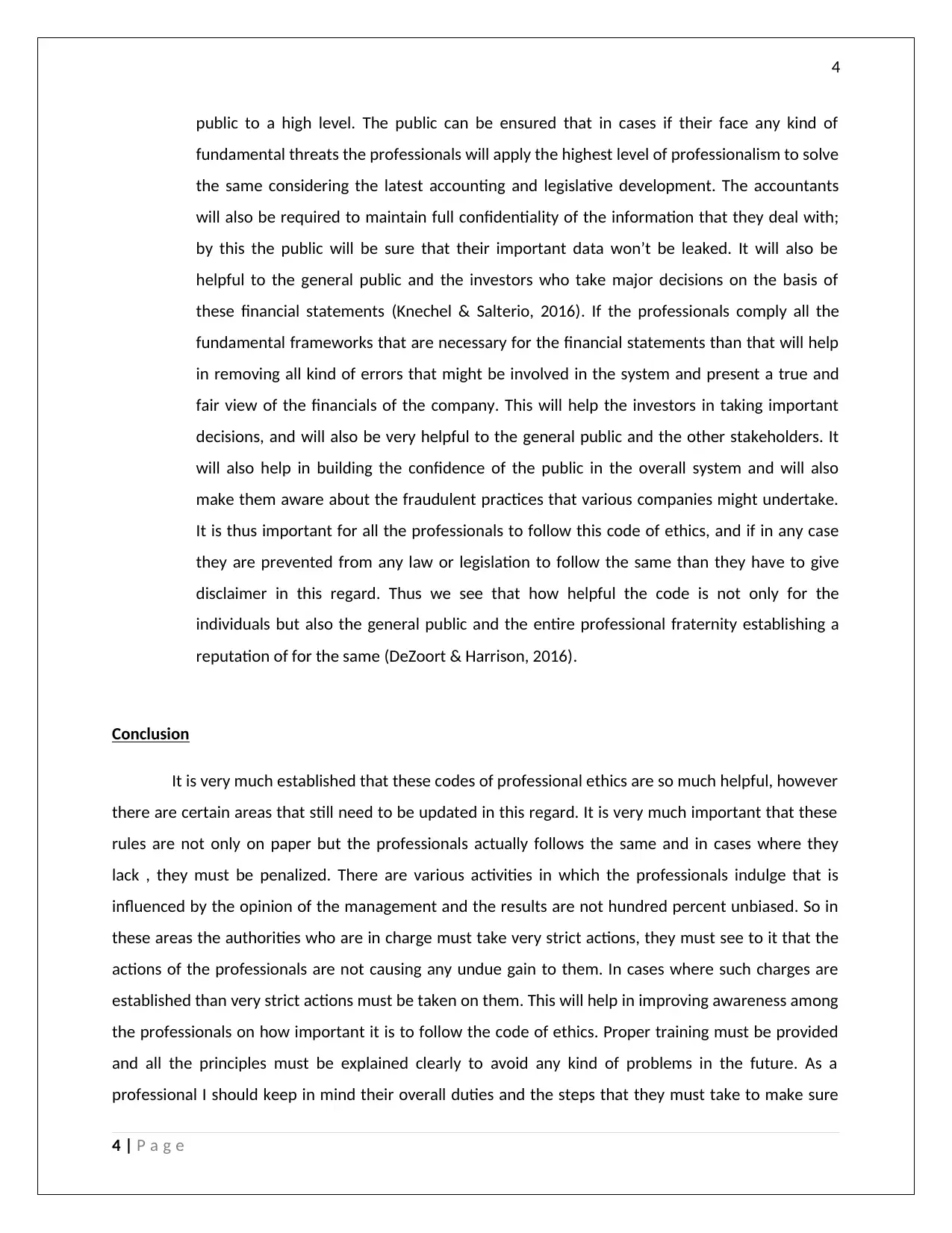
4
public to a high level. The public can be ensured that in cases if their face any kind of
fundamental threats the professionals will apply the highest level of professionalism to solve
the same considering the latest accounting and legislative development. The accountants
will also be required to maintain full confidentiality of the information that they deal with;
by this the public will be sure that their important data won’t be leaked. It will also be
helpful to the general public and the investors who take major decisions on the basis of
these financial statements (Knechel & Salterio, 2016). If the professionals comply all the
fundamental frameworks that are necessary for the financial statements than that will help
in removing all kind of errors that might be involved in the system and present a true and
fair view of the financials of the company. This will help the investors in taking important
decisions, and will also be very helpful to the general public and the other stakeholders. It
will also help in building the confidence of the public in the overall system and will also
make them aware about the fraudulent practices that various companies might undertake.
It is thus important for all the professionals to follow this code of ethics, and if in any case
they are prevented from any law or legislation to follow the same than they have to give
disclaimer in this regard. Thus we see that how helpful the code is not only for the
individuals but also the general public and the entire professional fraternity establishing a
reputation of for the same (DeZoort & Harrison, 2016).
Conclusion
It is very much established that these codes of professional ethics are so much helpful, however
there are certain areas that still need to be updated in this regard. It is very much important that these
rules are not only on paper but the professionals actually follows the same and in cases where they
lack , they must be penalized. There are various activities in which the professionals indulge that is
influenced by the opinion of the management and the results are not hundred percent unbiased. So in
these areas the authorities who are in charge must take very strict actions, they must see to it that the
actions of the professionals are not causing any undue gain to them. In cases where such charges are
established than very strict actions must be taken on them. This will help in improving awareness among
the professionals on how important it is to follow the code of ethics. Proper training must be provided
and all the principles must be explained clearly to avoid any kind of problems in the future. As a
professional I should keep in mind their overall duties and the steps that they must take to make sure
4 | P a g e
public to a high level. The public can be ensured that in cases if their face any kind of
fundamental threats the professionals will apply the highest level of professionalism to solve
the same considering the latest accounting and legislative development. The accountants
will also be required to maintain full confidentiality of the information that they deal with;
by this the public will be sure that their important data won’t be leaked. It will also be
helpful to the general public and the investors who take major decisions on the basis of
these financial statements (Knechel & Salterio, 2016). If the professionals comply all the
fundamental frameworks that are necessary for the financial statements than that will help
in removing all kind of errors that might be involved in the system and present a true and
fair view of the financials of the company. This will help the investors in taking important
decisions, and will also be very helpful to the general public and the other stakeholders. It
will also help in building the confidence of the public in the overall system and will also
make them aware about the fraudulent practices that various companies might undertake.
It is thus important for all the professionals to follow this code of ethics, and if in any case
they are prevented from any law or legislation to follow the same than they have to give
disclaimer in this regard. Thus we see that how helpful the code is not only for the
individuals but also the general public and the entire professional fraternity establishing a
reputation of for the same (DeZoort & Harrison, 2016).
Conclusion
It is very much established that these codes of professional ethics are so much helpful, however
there are certain areas that still need to be updated in this regard. It is very much important that these
rules are not only on paper but the professionals actually follows the same and in cases where they
lack , they must be penalized. There are various activities in which the professionals indulge that is
influenced by the opinion of the management and the results are not hundred percent unbiased. So in
these areas the authorities who are in charge must take very strict actions, they must see to it that the
actions of the professionals are not causing any undue gain to them. In cases where such charges are
established than very strict actions must be taken on them. This will help in improving awareness among
the professionals on how important it is to follow the code of ethics. Proper training must be provided
and all the principles must be explained clearly to avoid any kind of problems in the future. As a
professional I should keep in mind their overall duties and the steps that they must take to make sure
4 | P a g e
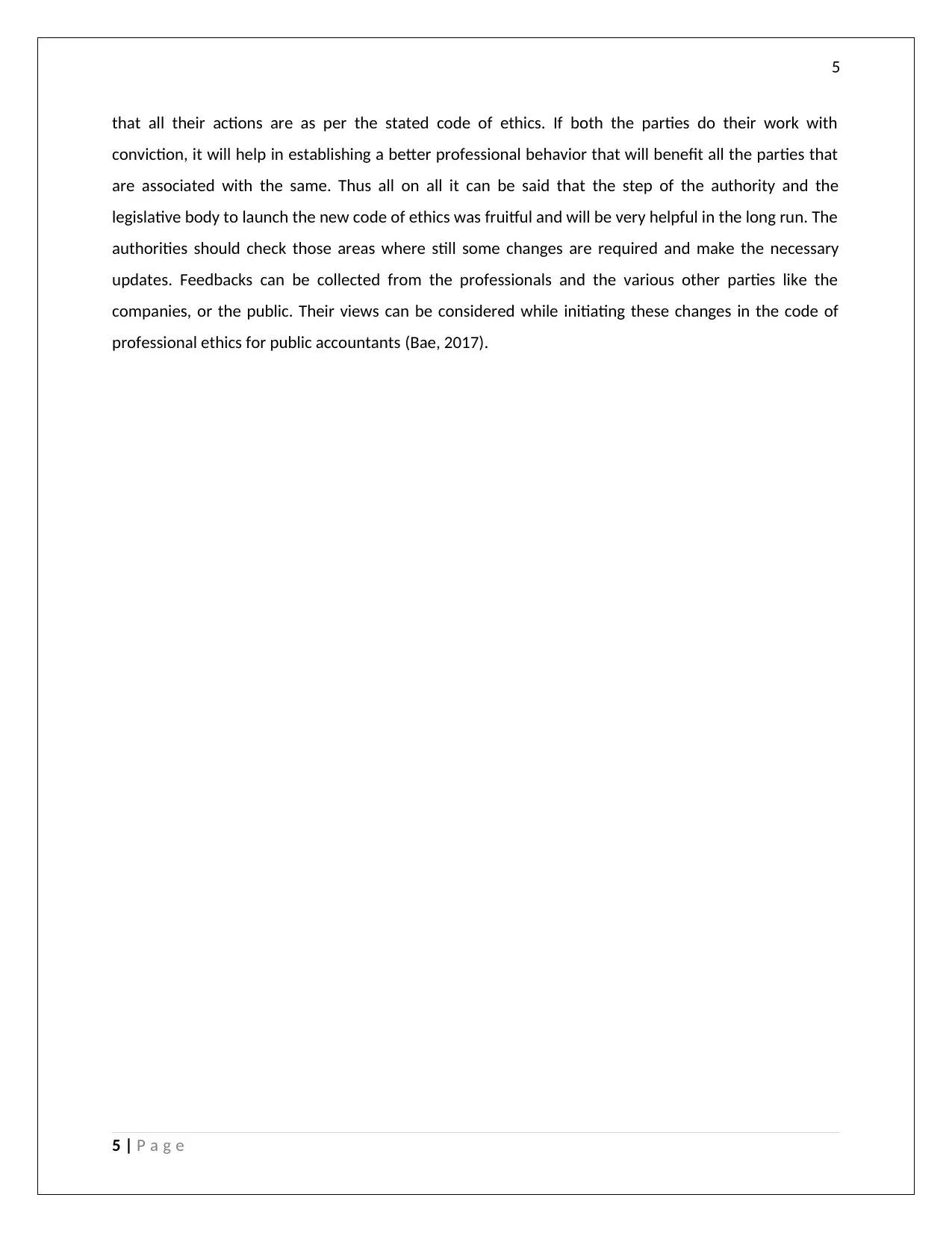
5
that all their actions are as per the stated code of ethics. If both the parties do their work with
conviction, it will help in establishing a better professional behavior that will benefit all the parties that
are associated with the same. Thus all on all it can be said that the step of the authority and the
legislative body to launch the new code of ethics was fruitful and will be very helpful in the long run. The
authorities should check those areas where still some changes are required and make the necessary
updates. Feedbacks can be collected from the professionals and the various other parties like the
companies, or the public. Their views can be considered while initiating these changes in the code of
professional ethics for public accountants (Bae, 2017).
5 | P a g e
that all their actions are as per the stated code of ethics. If both the parties do their work with
conviction, it will help in establishing a better professional behavior that will benefit all the parties that
are associated with the same. Thus all on all it can be said that the step of the authority and the
legislative body to launch the new code of ethics was fruitful and will be very helpful in the long run. The
authorities should check those areas where still some changes are required and make the necessary
updates. Feedbacks can be collected from the professionals and the various other parties like the
companies, or the public. Their views can be considered while initiating these changes in the code of
professional ethics for public accountants (Bae, 2017).
5 | P a g e
⊘ This is a preview!⊘
Do you want full access?
Subscribe today to unlock all pages.

Trusted by 1+ million students worldwide
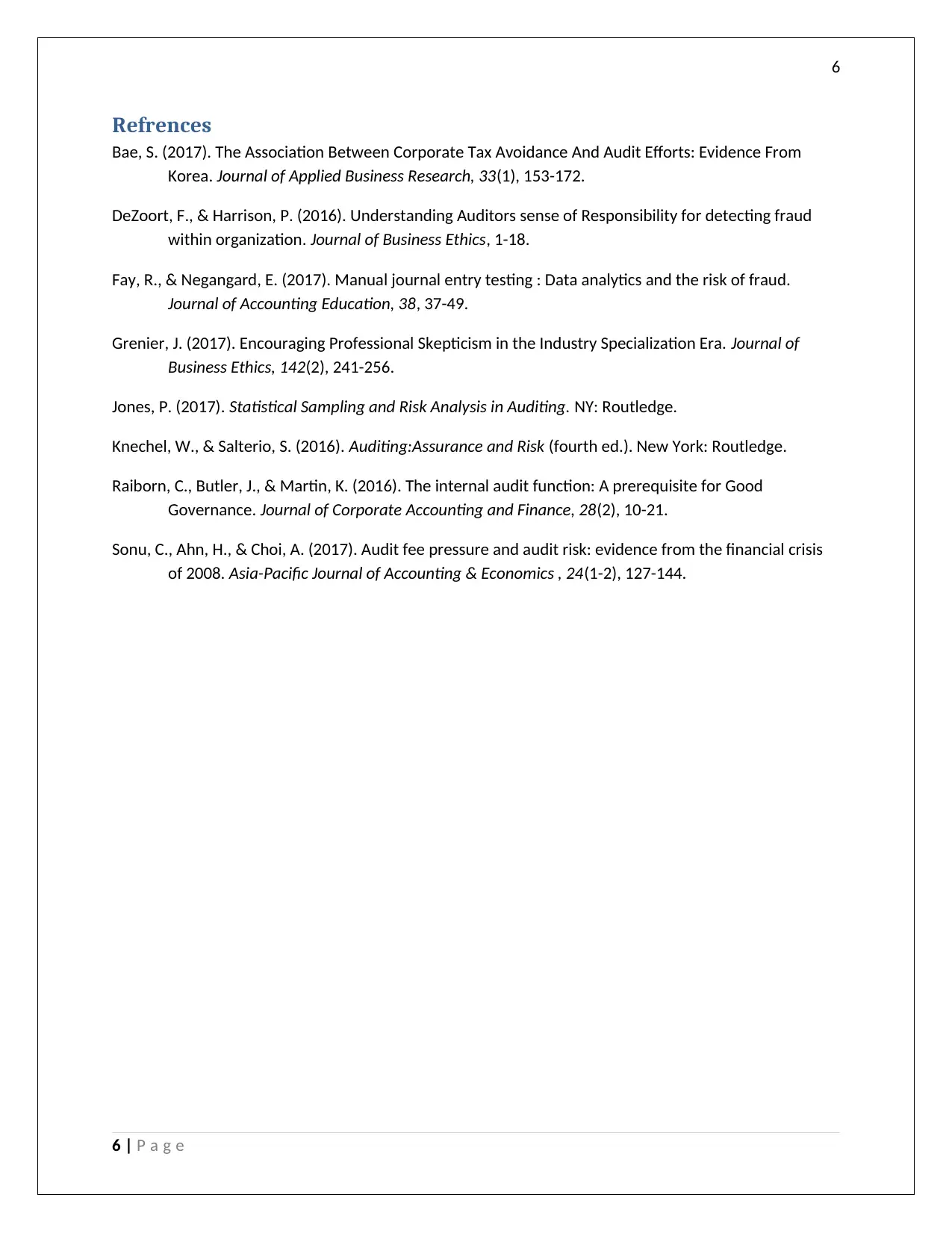
6
Refrences
Bae, S. (2017). The Association Between Corporate Tax Avoidance And Audit Efforts: Evidence From
Korea. Journal of Applied Business Research, 33(1), 153-172.
DeZoort, F., & Harrison, P. (2016). Understanding Auditors sense of Responsibility for detecting fraud
within organization. Journal of Business Ethics, 1-18.
Fay, R., & Negangard, E. (2017). Manual journal entry testing : Data analytics and the risk of fraud.
Journal of Accounting Education, 38, 37-49.
Grenier, J. (2017). Encouraging Professional Skepticism in the Industry Specialization Era. Journal of
Business Ethics, 142(2), 241-256.
Jones, P. (2017). Statistical Sampling and Risk Analysis in Auditing. NY: Routledge.
Knechel, W., & Salterio, S. (2016). Auditing:Assurance and Risk (fourth ed.). New York: Routledge.
Raiborn, C., Butler, J., & Martin, K. (2016). The internal audit function: A prerequisite for Good
Governance. Journal of Corporate Accounting and Finance, 28(2), 10-21.
Sonu, C., Ahn, H., & Choi, A. (2017). Audit fee pressure and audit risk: evidence from the financial crisis
of 2008. Asia-Pacific Journal of Accounting & Economics , 24(1-2), 127-144.
6 | P a g e
Refrences
Bae, S. (2017). The Association Between Corporate Tax Avoidance And Audit Efforts: Evidence From
Korea. Journal of Applied Business Research, 33(1), 153-172.
DeZoort, F., & Harrison, P. (2016). Understanding Auditors sense of Responsibility for detecting fraud
within organization. Journal of Business Ethics, 1-18.
Fay, R., & Negangard, E. (2017). Manual journal entry testing : Data analytics and the risk of fraud.
Journal of Accounting Education, 38, 37-49.
Grenier, J. (2017). Encouraging Professional Skepticism in the Industry Specialization Era. Journal of
Business Ethics, 142(2), 241-256.
Jones, P. (2017). Statistical Sampling and Risk Analysis in Auditing. NY: Routledge.
Knechel, W., & Salterio, S. (2016). Auditing:Assurance and Risk (fourth ed.). New York: Routledge.
Raiborn, C., Butler, J., & Martin, K. (2016). The internal audit function: A prerequisite for Good
Governance. Journal of Corporate Accounting and Finance, 28(2), 10-21.
Sonu, C., Ahn, H., & Choi, A. (2017). Audit fee pressure and audit risk: evidence from the financial crisis
of 2008. Asia-Pacific Journal of Accounting & Economics , 24(1-2), 127-144.
6 | P a g e
1 out of 7
Related Documents
Your All-in-One AI-Powered Toolkit for Academic Success.
+13062052269
info@desklib.com
Available 24*7 on WhatsApp / Email
![[object Object]](/_next/static/media/star-bottom.7253800d.svg)
Unlock your academic potential
Copyright © 2020–2026 A2Z Services. All Rights Reserved. Developed and managed by ZUCOL.





